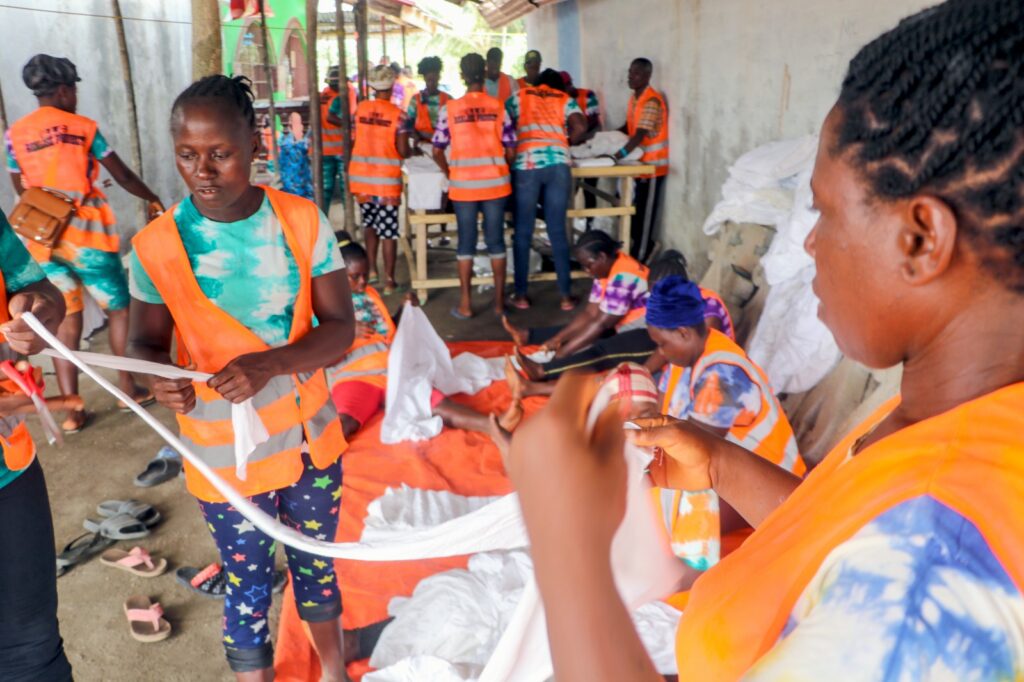
The REALISE Project, is making significant strides in unlocking the potential of women through life skills development.
A case in point is the involvement of 31 beneficiary working group members, in health awareness and production of tie-dye in the Graceland Community situated along the Kakata-Monrovia highway in Lower Margibi County. The Beneficiary Working Group, headed by its Supervisor, Irene Gbemelen, comprises 25 female and 6 male.
The Tie-dye activities are carried out on Tuesday and Thursday, and the health awareness is on Saturday. According to Ms. Gbemelen, the tie-dye is the first women empowerment subproject under the REALISE Project, and they are excited to be the first lucky group of women. “I am excited and optimistic that this subproject will equip women with essential skills, thus fostering independence and enabling them to contribute meaningfully to their households,” said Ms. Irene Gbemelen.
Furthermore, Ms. Gbemelen highlighted that some of the women in her group have never been to school and lack skills enabling them to independently cater to household needs or assist their spouses with the upkeep of the home. This challenge sometimes makes them feel less important in their homes and communities. “Amidst these circumstances/challenges faced by women, I am hopeful that the grant received from the REALISE Project to empower women with life skills and employability development training will mitigate the challenges, transform their lives, increase their resilience and ultimately, reduce the disadvantage they go through every day at the hands of their partners,” she asserts.
Beyond Life Skill and employability development, the group incorporates community engagement activities, such as health awareness campaigns. During weekends, the women take on the role of educators, imparting knowledge on basic hygiene and sanitation practices to community residents. She underscored the importance of this initiative in promoting health and hygiene practices and safeguarding the environment. “The health awareness will help promote sanitation and protect our environment from diseases,” Ms. Gbemelen narrated.
Madam Gbemelen believes this subproject has great potential to transform the lives of women and girls; hence, she advocates for expansion. She thinks that by reaching out to more women and girls, the REALISE Project will be significantly contributing to women empowerment and fostering sustainable development.
The Tie-dye Production subproject, paves the way for a future where women are valued, empowered, and able to realize their full potential.
The subproject is under the Temporary Employment Support and Employment Development for Vulnerable Workers (TESEDVW) Component of the REALISE Project which targets 17,000 beneficiaries in Montserrado and Margibi Counties. It seeks to provide temporary employment for beneficiaries through public works activities; Waste and Sanitation, Community Beautification, Maintenance and Rehabilitation of community access road/street, Teaching/Community Education, support activities for school going children, and elderly, among others, and Supplementary Healthcare and other public information activities.
Component resources support provision of grant for procurement of simple tools and materials to implement subproject activities, labor subsidies to assist beneficiaries with some of their needs while executing subproject activities, and delivery of life skills and employability development training to incorporate behavior modification around self-esteem.
The TESEDVW Component is not only improving the environmental conditions of their communities through cleaning of community alleys, chlorination of wells/pumps and beautification, health awareness in communities and schools, but also supporting employability development initiatives that empower beneficiaries, especially women and girls, beyond the REALISE Project.
30